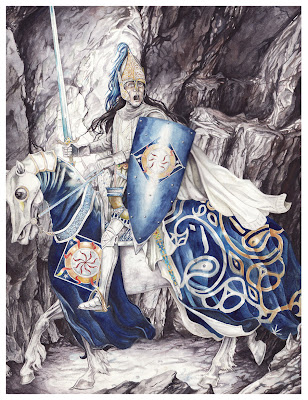Over the past 7 years a significant number of hits on this site have been searching for Tolkien's "Fingolfin and Morgoth" -- by far, the two words that find the largest number of hits in one or other of the Tolkien extracts found on these pages. SO... over the next few postings I will be serialising the story -- from "The Geste of Beren and Lúthien" -- the narrative poem that I judge to be at the very core of Tolkien's creation.
In that vast shadow once of yore
Fingolfin stood: his shield he bore
with field of heaven's blue and star
of crystal shining pale afar.
In overmastering wrath and hate
desperate he smote upon that gate,
the Gnomish king, there standing lone,
while endless fortresses of stone
engulfed the thin clear ringing keen
of silver horn on baldric green.
His hopeless challenge dauntless cried
Fingolfin there: 'Come, open wide
dark king, our ghastly brazen doors!
Come forth, whom earth and heaven abhors!
Come forth, O monstrous craven lord,
and fight with thine own hand and sword,
thou wielder of hosts of banded thralls,
thou tyrant leaguered with strong walls,
thou foe of Gods and elvish race!
I wait thee here. Come! Show thy face!'
(lines 3,538 to 3,557)
The Geste of Beren and Lúthien
J.R.R. Tolkien
[Image by Peter Xavier Price]










